10 Sugar-Free Fruits That Will Keep Your Diet on Track
Are you craving the natural sweetness of fruits while keeping your sugar intake in check? You're not alone. Millions of health-conscious individuals search for ways to satisfy their sweet tooth without compromising their dietary goals.
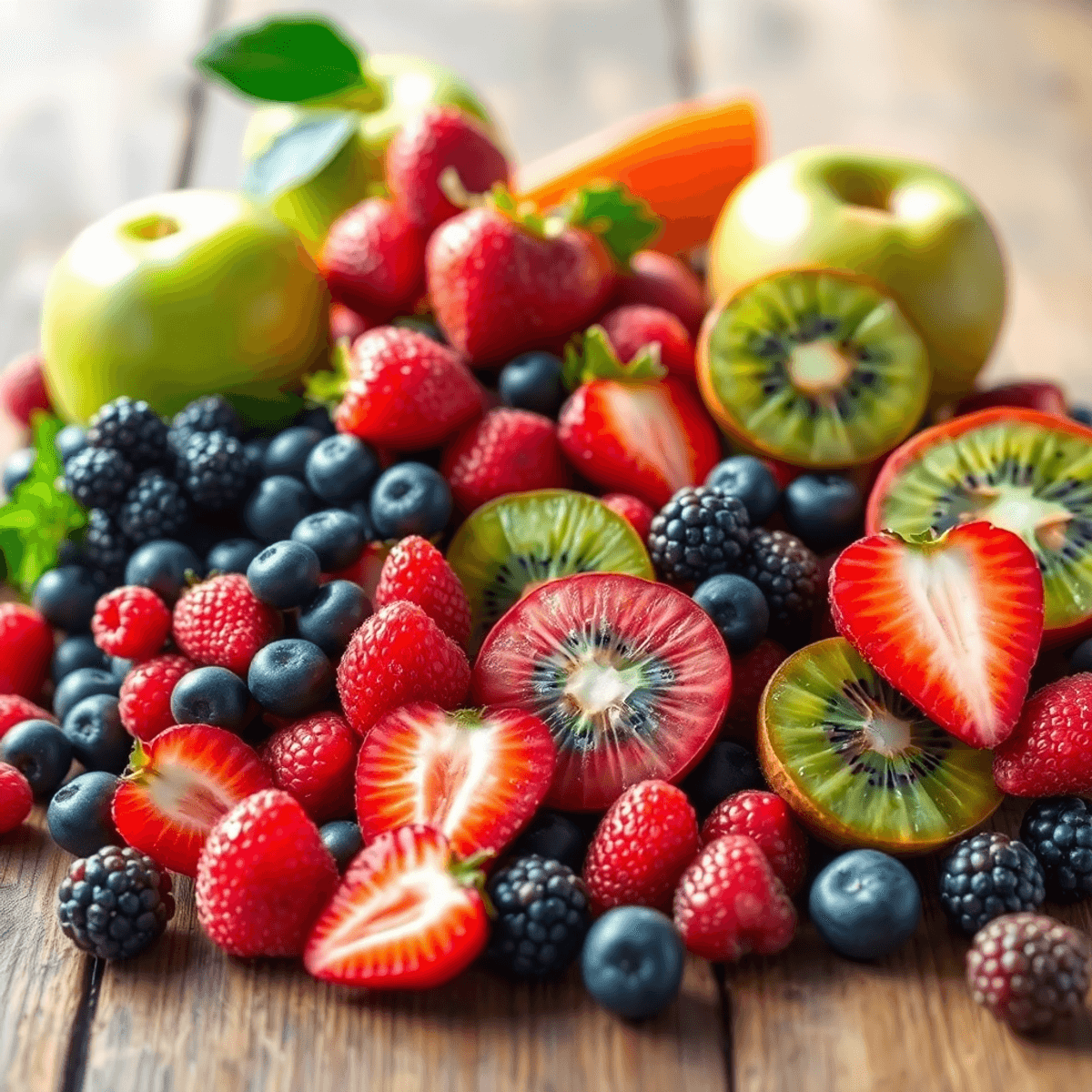
This guide unveils 10 naturally low-sugar fruits that deliver essential nutrients without spiking your blood sugar levels. These fruits contain minimal natural sugars while offering maximum nutritional benefits.
What makes a fruit "sugar-free" or "low-sugar"? These fruits typically contain:
- Less than 10g of sugar per serving
- A low glycemic index rating
- High fiber content to slow sugar absorption
Managing sugar intake plays a vital role in:
- Weight management
- Blood sugar control
- Reduced inflammation
- Better dental health
These carefully selected fruits pack powerful health benefits:
- Rich in antioxidants
- High in essential vitamins
- Loaded with dietary fiber
- Natural immune system boosters
Additionally, if you're looking for alternatives to traditional sweeteners, consider exploring the truth about erythritol as a sugar substitute. It's essential to make informed choices when it comes to sweeteners, especially for those managing diabetes. For instance, jaggery is often thought of as a healthier alternative, but it's crucial to understand its effects on blood sugar levels.
In case you're interested in indulging your sweet tooth guilt-free, you might want to try our Kaju Katli which is sugar-free and diabetic-friendly, making it the perfect keto-friendly option.
Let's explore these nutritious fruits that keep your diet on track while satisfying your fruit cravings.
Understanding Natural Sugars in Fruits
Fruits contain natural sugars called fructose, a type of carbohydrate your body uses for energy. Unlike processed foods with added sugars, fruits package their sweetness with essential nutrients, fiber, and water.
The key difference lies in how your body processes these sugars:
- Natural fruit sugars: Release slowly into your bloodstream, accompanied by fiber
- Added sugars: Spike blood sugar quickly, offering minimal nutritional benefits
A fruit's sugar content depends on several factors:
- Growing conditions
- Ripeness level
- Variety of fruit
- Climate conditions
The glycemic index (GI) measures how quickly foods raise blood sugar levels. The glycemic load (GL) considers both the GI and portion size. Fruits with lower GI and GL values:
- Digest more slowly
- Provide steady energy
- Help maintain stable blood sugar levels
Some fruits naturally contain less sugar due to their:
- Higher water content
- Higher fiber concentration
- Genetic composition
- Growth patterns
If you're looking for delicious options that align with these dietary needs, consider exploring some of our best-selling products which include a range of cakes, cookies, chocolates and more.
Lastly, don't forget to share your experiences and refer a friend to enjoy these delightful treats too!
Benefits of Including Sugar-Free and Low-Sugar Fruits in Your Diet
Low-sugar fruits pack a powerful nutritional punch while keeping your blood sugar levels stable. These fruits serve as essential components of diabetic-friendly diets, offering natural sweetness without dramatic glucose spikes.
Key Health Benefits:
- Blood Sugar Management: The lower sugar content combined with high fiber helps maintain steady glucose levels. For instance, incorporating more sugar-free products into your diet can further assist in managing your sugar intake.
- Weight Control: Lower calorie density supports healthy weight management goals
- Digestive Health: High fiber content aids digestion and promotes gut health. This is particularly beneficial during periods like Ramadan when dietary changes are common.
- Nutrient Density: Rich in-
- Essential vitamins (A, C, E)
- Minerals (potassium, magnesium)
- Antioxidants (flavonoids, polyphenols)
- Dietary fiber
These fruits allow you to enjoy nature's sweetness while maintaining a balanced, health-conscious diet. Their high water content and fiber make them filling options for snacks and meals, supporting both nutrition goals and appetite control.
Top 10 Sugar-Free or Low-Sugar Fruits to Keep Your Diet on Track
Selecting the right fruits can make a significant difference in managing your sugar intake. Here's a curated list of naturally sugar-free and low-sugar fruits that pack a nutritional punch without compromising your health goals.
These fruits stand out for their minimal sugar content while delivering essential nutrients your body needs. Each selection has been carefully chosen based on its glycemic impact and nutritional profile.
1. Guava (Amrood)
Guava emerges as a powerhouse of nutrition with remarkably low sugar content. A single serving (100g) contains:
- Sugar Content: 8.9g per 100g
- Fiber: 5.4g per 100g
- Net Carbs: 3.5g per 100g
:max_bytes(150000):strip_icc()/Guava-15d1050d22034909bfca038ef1f8aaa2.jpg)
This tropical fruit excels in blood sugar management through its:
- High fiber content that slows sugar absorption
- Rich pectin levels supporting digestive health
- Low glycemic index rating of 19
Guava's impressive nutrient density includes:
- 4x more vitamin C than oranges
- High levels of lycopene
- Substantial potassium content
The fruit's natural compounds help regulate blood sugar levels, making it an excellent choice for people monitoring their sugar intake. Its unique combination of fiber and nutrients creates a satisfying eating experience without the sugar spike common in other fruits.
2. Avocado (Butter Fruit)
Avocados are a unique fruit with very low sugar content, containing just 1 gram of sugar per whole fruit. This creamy, nutrient-packed fruit offers:
- 15 grams of heart-healthy monounsaturated fats
- 9 grams of fiber per fruit
- Essential vitamins E, K, and B-complex
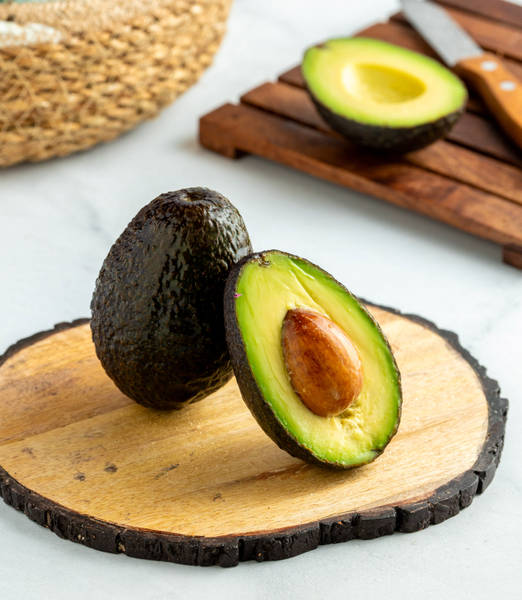
The combination of healthy fats and fiber in avocados helps you feel full and keeps your blood sugar levels stable. Here are some delicious ways to enjoy avocados:
- Spread on whole-grain toast
- Blended into smoothies
- Diced in salads
- Mashed into guacamole
Avocados are good for your heart too! They have the right balance of omega-3 and omega-6 fatty acids. The natural plant sterols found in avocados can help lower cholesterol levels, making them a great choice for heart health.
3. Papaya - Moderate Sugar Digestive Fruit Benefits
Papaya stands out as a digestive powerhouse with its moderate sugar content of 8g per 100g serving. This tropical fruit contains papain, a natural enzyme that aids protein breakdown and supports healthy digestion.
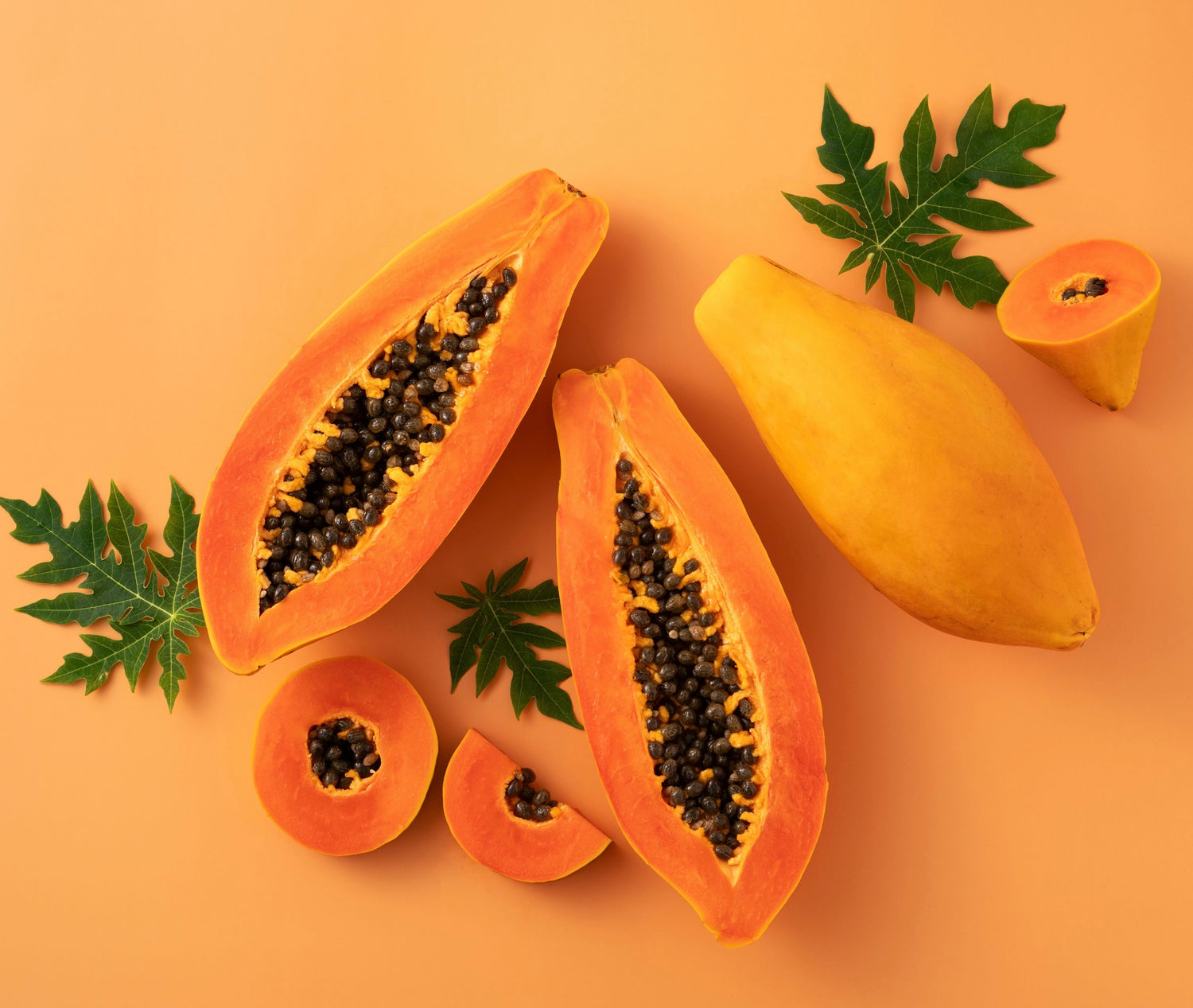
The fruit's nutrient profile includes:
- Vitamin C: 88% of daily value per serving
- Vitamin A: 33% of daily value per serving
- Fiber: 2.5g per 100g serving
- Potassium: Essential for heart health
The ripe fruit's natural sweetness comes balanced with a glycemic index of 60, making it suitable for controlled portions in low-sugar diets. Its soft texture and easy digestibility make papaya an excellent breakfast choice or post-meal digestive aid.
Raw papaya offers even lower sugar content, perfect for those strictly monitoring their sugar intake. You can enjoy it in salads or as a meat tenderizer.
4. Indian Gooseberry (Amla) - A Nutrient Powerhouse with Low Sugar
Indian Gooseberry, also known as Amla, is a highly nutritious fruit that contains very little sugar - only 2.4g per 100g serving. Despite its tart taste, Amla is packed with vitamin C, providing 20 times more than oranges.
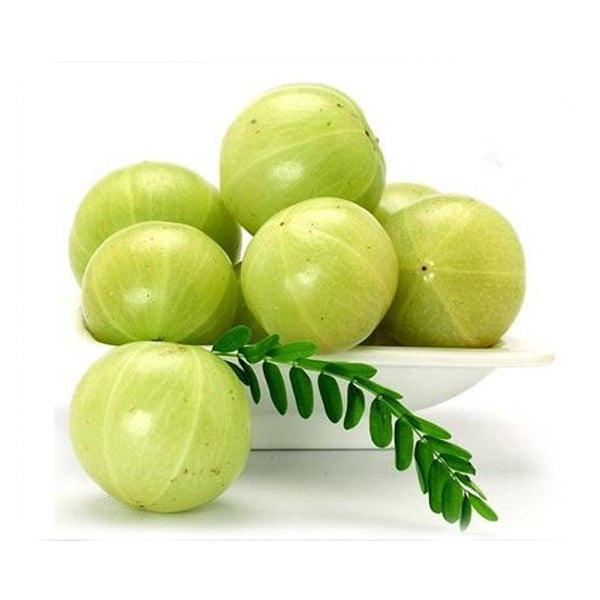
The antioxidant properties of Amla come from its high content of polyphenols:
- Gallic acid - fights free radicals
- Ellagic acid - supports cellular health
- Emblicanin A & B - unique compounds exclusive to Amla
You can include Amla in your diet in various ways:
- Fresh fruit consumption
- Dried powder form
- Amla juice
- Traditional supplements
The natural compounds found in Amla promote liver function, strengthen the immune system, and help regulate blood sugar levels. Its bitter-sour taste makes it a great addition to sugar-free diets, especially for individuals with diabetes or those following low-sugar eating plans.
5. Tomato (Technically a Fruit)
Tomatoes are a unique addition to the list of sugar-free fruits, containing just 5g of natural sugars per serving. These versatile fruits are packed with nutrients, especially lycopene, a powerful antioxidant known for its benefits in heart health and cancer prevention.

Key Nutritional Benefits:
- High in Vitamin C (40% of daily value per serving)
- Rich source of potassium
- Contains beneficial compounds like beta-carotene
- Only 22 calories per medium tomato
The culinary uses of tomatoes make them an excellent choice for low-sugar diets. You can enjoy them:
- Raw in salads
- Cooked in curries
- Blended into smoothies
- Grilled as a side dish
For maximum nutritional benefits, consume tomatoes with a small amount of healthy fat, as this enhances lycopene absorption in your body.
6. Lemon/Lime (Nimbu) - No Sugar Citrus Fruits with Vitamin C Benefits
Lemons and limes are unique among fruits because they contain no sugar. Each fruit has only 1-2 grams of sugar. These citrus fruits are also an excellent source of vitamin C, with one lemon providing 51% of your daily requirement.
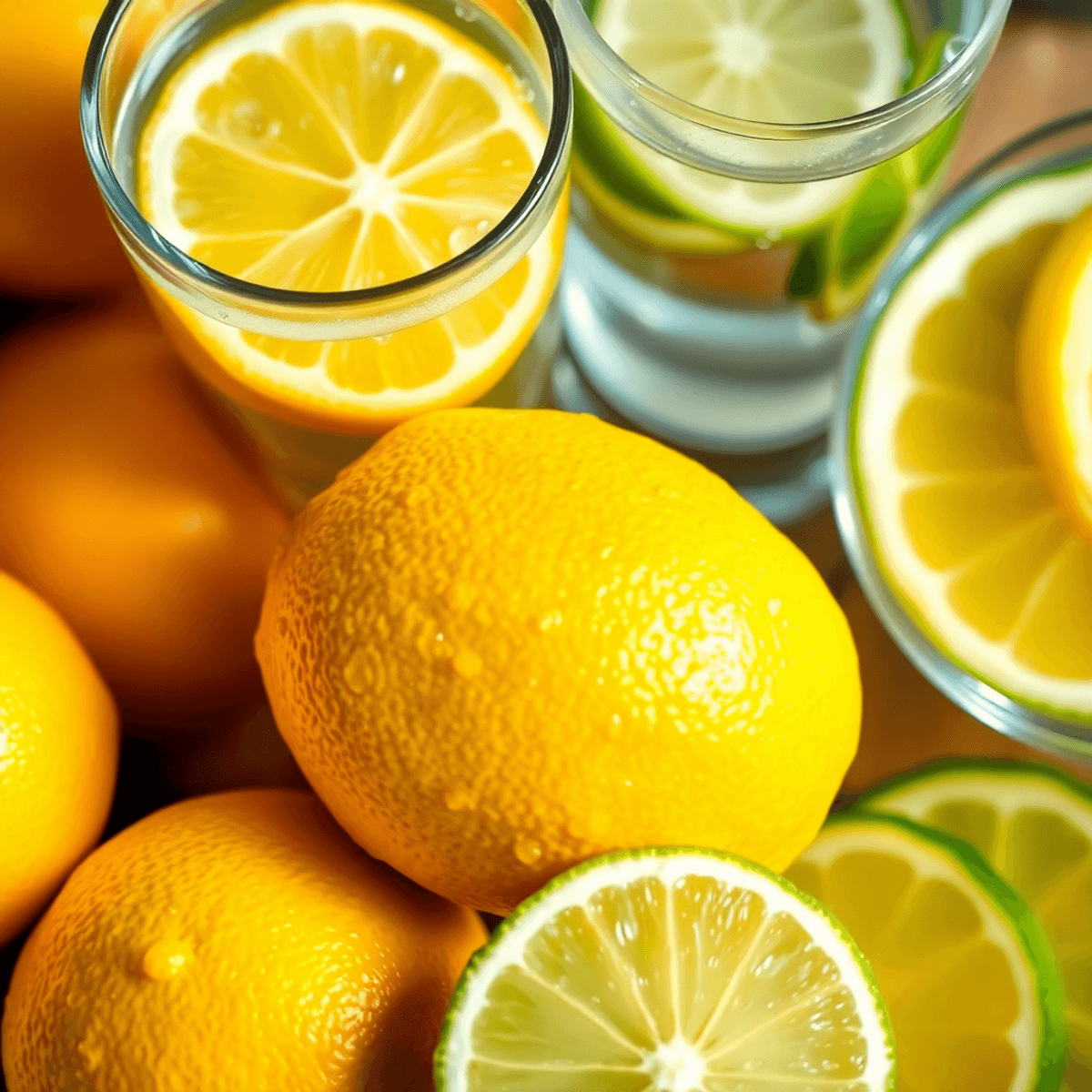
The versatility of these fruits makes them invaluable for health-conscious individuals:
- Zero-calorie flavor enhancer: Add zest to water, tea, or dishes without sugar impact
- Natural preservative: Prevents browning in cut fruits and vegetables
- Digestive aid: Supports healthy digestion and liver function
- Hydration booster: Creates refreshing beverages without added sugars
You can maximize lemon benefits by:
- Squeezing fresh juice into warm water for morning detox
- Using as a salt substitute in cooking
- Adding to salad dressings instead of high-sugar alternatives
- Incorporating into marinades for meat and fish
These citrus fruits are essential for anyone following a sugar-conscious lifestyle, offering robust flavor without compromising dietary goals. Additionally, their health benefits extend beyond just being low in sugar and high in vitamin C.
7. Jamun (Indian Blackberry) - Jamun Diabetic Fruit Jamun Benefits
Jamun stands out as a powerful ally for blood sugar management. This purple-black fruit contains jamboline - a bioactive compound that helps regulate blood glucose levels. With a remarkably low glycemic index of 25, Jamun prevents sudden spikes in blood sugar levels.

The fruit's benefits extend beyond its anti-diabetic properties:
- Contains natural insulin-like compounds
- Rich in anthocyanins that combat free radicals
- Provides essential minerals like iron and potassium
- Offers just 3-4g of sugar per 100g serving
Traditional Ayurvedic medicine has long recognized Jamun's ability to support pancreatic function. The seeds, bark, and fruit pulp work together to enhance insulin production and improve glucose tolerance. You'll find Jamun particularly abundant during the monsoon season across India, making it an accessible choice for your low-sugar fruit selection.
To complement the health benefits of Jamun, consider incorporating other low-glycemic food options into your diet. For instance, Keto-friendly almond cookies made with 100% almond flour and sweetened with low GI stevia can be a great addition.
8. Coconut (Tender Coconut Flesh) - Coconut Low Sugar Tender Coconut Nutrition Benefits
Tender coconut flesh is a naturally sweet fruit option that is low in sugar. It contains only 3.7 grams of natural sugars per 100-gram serving, making it a great choice for those watching their sugar intake.
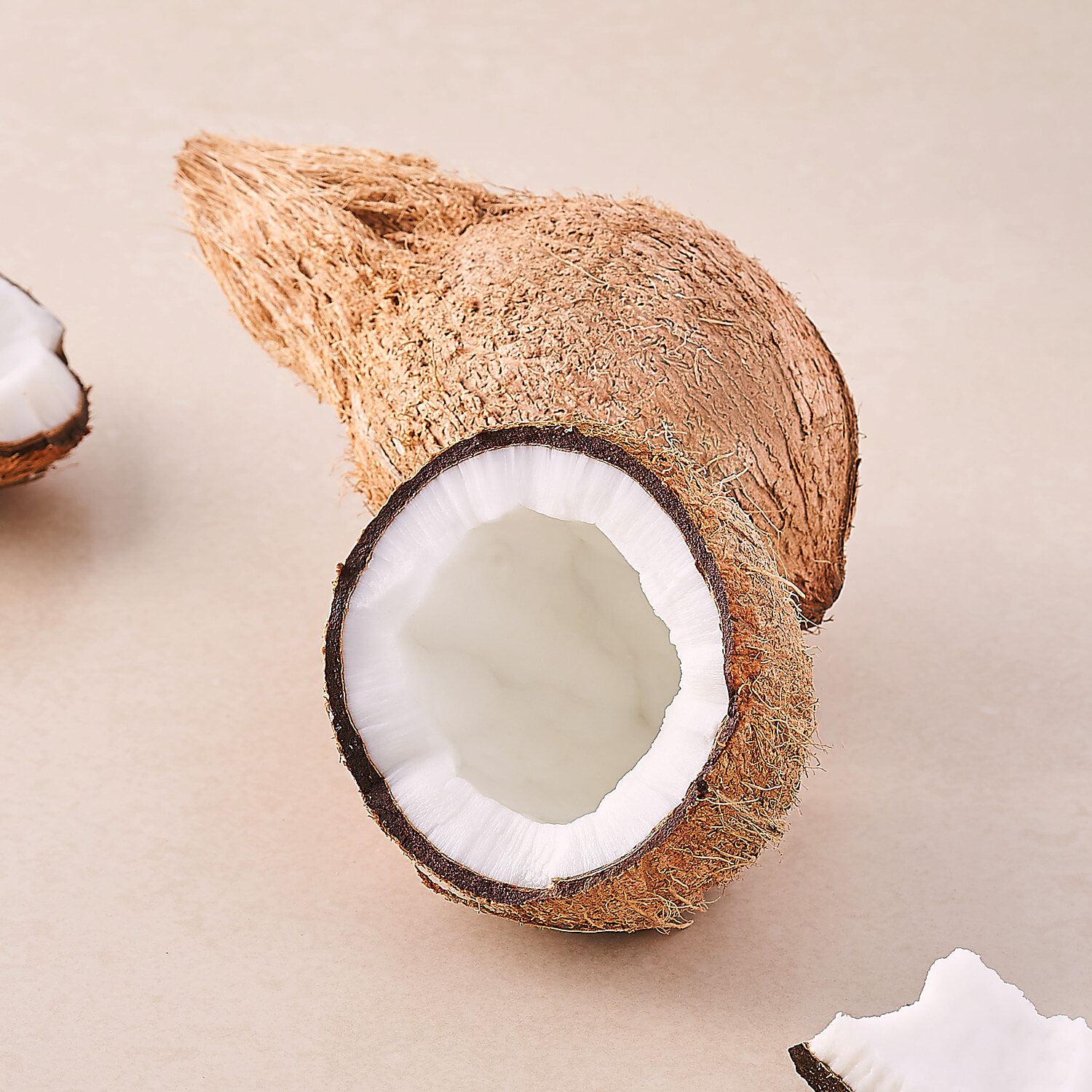
Key nutritional benefits:
- Contains healthy fats called medium-chain triglycerides (MCTs)
- Provides important electrolytes like potassium and magnesium
- Offers 2.6 grams of dietary fiber per serving
- Contains minerals such as iron, zinc, and phosphorus
The soft and jelly-like texture of tender coconut flesh makes it enjoyable to eat while also providing essential nutrients. Its natural electrolyte content helps maintain hydration, which is especially beneficial in hot weather or after exercise.
You can enjoy tender coconut flesh:
- Raw, straight from the coconut
- Blended into smoothies
- Added to fruit salads
- Mixed into yogurt bowls
In addition to its fresh form, coconut can also be enjoyed in other ways. For example, you can try sugar-free coconut cookies that are made with real coconut and are suitable for diabetics. These keto-friendly snacks are sweetened with a natural stevia blend that has a low glycemic index, making them an ideal choice for those who want to limit their sugar consumption.
9. Watermelon (In Moderation)
Watermelon stands out as a refreshing choice for health-conscious individuals with its impressive 92% water content. A single cup serving contains less than 10g of natural sugars - making it a smart choice for those monitoring their sugar intake.
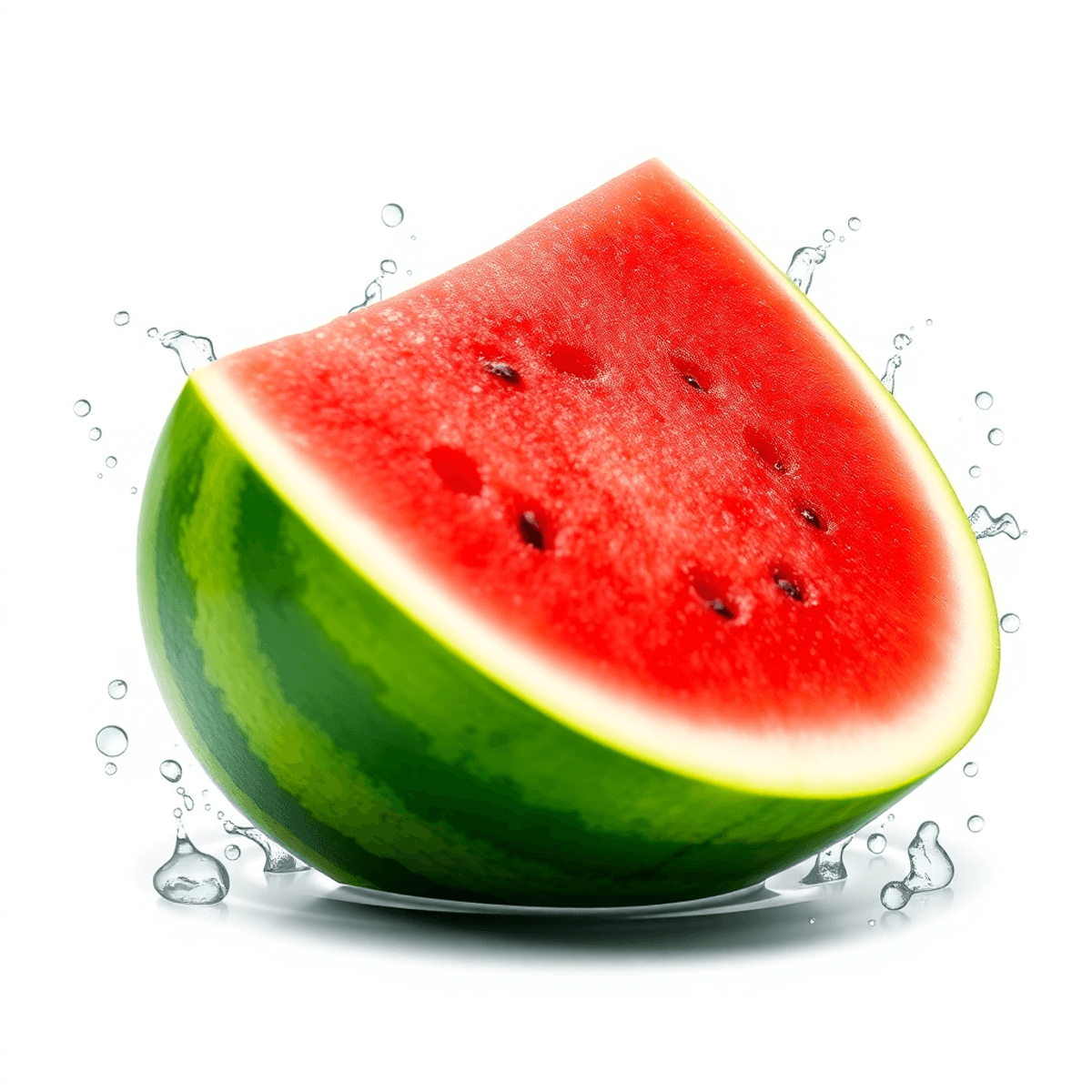
Key nutritional benefits:
- Rich in lycopene and vitamin C
- Contains L-citrulline for muscle recovery
- Natural electrolytes for hydration
- Only 46 calories per cup
The high water content helps you feel full while consuming fewer calories. You'll get maximum benefits by eating watermelon in the morning or as a pre-workout snack. The natural electrolytes support hydration during hot weather or intense physical activity.
Portion control tip: Stick to 1-2 cups per serving to maintain blood sugar balance while enjoying its sweet, refreshing taste.
10. Strawberries
Strawberries are a delicious low-sugar option, with only 5-7g of natural sugars per cup. These bright red berries are packed with nutrients, especially vitamin C - one serving provides 85% of your daily requirement.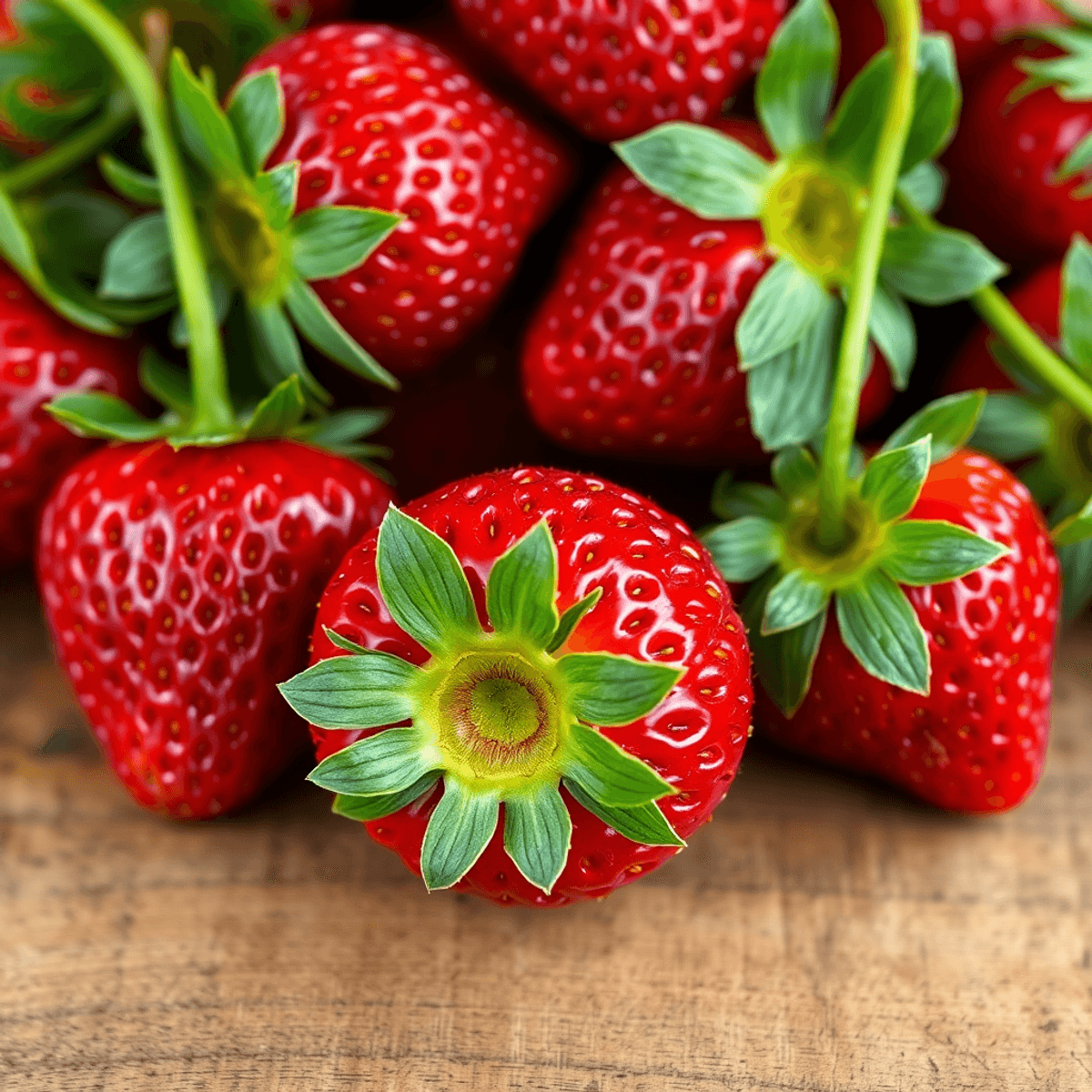
Strawberries contain beneficial compounds called polyphenols and anthocyanins, which may help:
- Protect against heart disease
- Improve brain function
- Reduce inflammation
- Regulate blood sugar levels
- Support skin health
The fiber in strawberries (3g per cup) helps slow down sugar absorption, making them a great choice for managing blood sugar levels. There are many ways to enjoy strawberries:
- Mixed into plain yogurt
- Blended in smoothies
- Added to overnight oats
- Eaten fresh as a snack
- Paired with nuts for a balanced treat
Whether fresh or frozen, strawberries retain their nutritional benefits, making them a convenient option for health-conscious individuals all year round.
Important Considerations When Choosing Fruits for Low-Sugar Diets
Selecting the right fruits for a low-sugar diet requires attention to several key factors:
Portion Control Matters
- Track serving sizes to manage total sugar intake
- Use measuring cups or kitchen scales for accuracy
- Remember that natural sugars still count toward daily limits
Best Times for Consumption
- Eat fruits earlier in the day
- Pair with protein or healthy fats to slow sugar absorption
- Space fruit servings throughout the day
Shopping and Storage Tips
- Choose fruits at peak ripeness
- Avoid pre-cut fruits with added preservatives
- Store properly to maintain nutritional value
Watch Out For
- Hidden sugars in dried fruits
- Fruit juices - stick to whole fruits
- Canned fruits in syrup
Smart Combinations
- Mix low-sugar fruits with protein-rich yogurt
- Add to salads for natural sweetness
- Blend with leafy greens in smoothies
Remember: No fruit is completely sugar-free, but these mindful choices help maintain balanced blood sugar levels while enjoying nature's sweetness.
FAQs
1.What are sugar-free and low-sugar fruits, and why are they important in managing sugar intake?
Sugar-free and low-sugar fruits contain minimal natural sugars (fructose), making them ideal for those looking to reduce sugar intake. Managing sugar consumption is crucial for maintaining healthy blood sugar levels, supporting weight management, and promoting overall health.
2.How do natural sugars in fruits differ from added sugars, and why does it matter?
Natural sugars like fructose occur naturally in fruits, whereas added sugars are incorporated during processing. Natural sugars come with fiber, vitamins, and antioxidants that aid digestion and provide health benefits, while added sugars can lead to spikes in blood sugar and negative health effects.
3.Which fruits are naturally low in sugar or sugar-free and beneficial for a low-sugar diet?
Some naturally low-sugar or sugar-free fruits include guava, avocado, papaya, Indian gooseberry (amla), tomato, lemon/lime (nimbu), jamun (Indian blackberry), tender coconut flesh, watermelon (in moderation), and strawberries. These fruits offer essential nutrients while keeping sugar intake low.
4.What are the health benefits of including sugar-free or low-sugar fruits in my diet?
Including these fruits supports diabetic-friendly diets, aids blood sugar control, contributes to weight management and digestion, and provides a rich source of vitamins, minerals, fiber, and antioxidants without the high sugar impact.
4.How does the glycemic index affect fruit selection for blood sugar management?
The glycemic index (GI) measures how quickly foods raise blood glucose levels. Fruits with a low GI have less impact on blood sugar. Choosing low-GI fruits like guava, jamun, and avocado helps maintain stable blood sugar levels.


